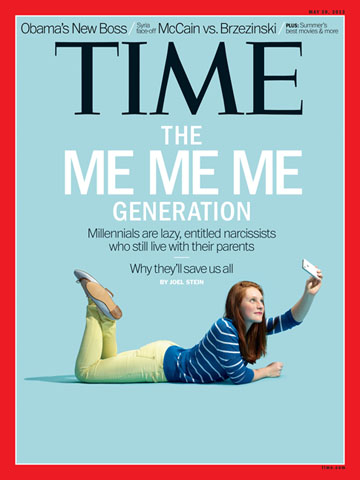
Correction Appended: May 9, 2013
I am about to do what old people have done throughout history: call those younger than me lazy, entitled, selfish and shallow. But I have studies! I have statistics! I have quotes from respected academics! Unlike my parents, my grandparents and my great-grandparents, I have proof.
Here's the cold, hard data: The incidence of narcissistic personality disorder is nearly three times as high for people in their 20s as for the generation that's now 65 or older, according to the National Institutes of Health; 58% more college students scored higher on a narcissism scale in 2009 than in 1982. Millennials got so many participation trophies growing up that a recent study showed that 40% believe they should be promoted every two years, regardless of performance. They are fame-obsessed: three times as many middle school girls want to grow up to be a personal assistant to a famous person as want to be a Senator, according to a 2007 survey; four times as many would pick the assistant job over CEO of a major corporation. They're so convinced of their own greatness that the National Study of Youth and Religion found the guiding morality of 60% of millennials in any situation is that they'll just be able to feel what's right. Their development is stunted: more people ages 18 to 29 live with their parents than with a spouse, according to the 2012 Clark University Poll of Emerging Adults. And they are lazy. In 1992, the nonprofit Families and Work Institute reported that 80% of people under 23 wanted to one day have a job with greater responsibility; 10 years later, only 60% did.
Millennials consist, depending on whom you ask, of people born from 1980 to 2000. To put it more simply for them, since they grew up not having to do a lot of math in their heads, thanks to computers, the group is made up mostly of teens and 20-somethings. At 80 million strong, they are the biggest age grouping in American history. Each country's millennials are different, but because of globalization, social media, the exporting of Western culture and the speed of change, millennials worldwide are more similar to one another than to older generations within their nations. Even in China, where family history is more important than any individual, the Internet, urbanization and the one-child policy have created a generation as overconfident and self-involved as the Western one. And these aren't just rich-kid problems: poor millennials have even higher rates of narcissism, materialism and technology addiction in their ghetto-fabulous lives.
They are the most threatening and exciting generation since the baby boomers brought about social revolution, not because they're trying to take over the Establishment but because they're growing up without one. The Industrial Revolution made individuals far more powerful--they could move to a city, start a business, read and form organizations. The information revolution has further empowered individuals by handing them the technology to compete against huge organizations: hackers vs. corporations, bloggers vs. newspapers, terrorists vs. nation-states, YouTube directors vs. studios, app-makers vs. entire industries. Millennials don't need us. That's why we're scared of them.
